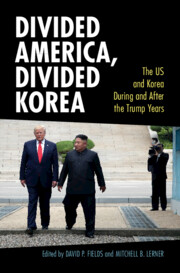Book contents
- Divided America, Divided Korea
- Cambridge Studies in US Foreign Relations
- Divided America, Divided Korea
- Copyright page
- Contents
- Figures
- Maps
- Table
- Additional material
- Contributors
- Acknowledgments
- Introduction
- 1 The Trump Administration’s Place in the History of US Relations with the Korean Peninsula
- 2 Plus Ça Change? South Korean Public Opinion of the US during the Trump Administration
- 3 The Trumpian Wake-Up Call
- 4 North Korean Human Rights during the Trump Administration
- 5 South Korean Public Diplomacy vis-à-vis the US
- 6 Stunted Growth or Growing Pains
- 7 Inflection Points
- 8 How to Make Friends and Alienate People
- Conclusion
- Index
Conclusion
The Trump Legacy in Korea, East Asia, and the World
Published online by Cambridge University Press: 15 March 2024
- Divided America, Divided Korea
- Cambridge Studies in US Foreign Relations
- Divided America, Divided Korea
- Copyright page
- Contents
- Figures
- Maps
- Table
- Additional material
- Contributors
- Acknowledgments
- Introduction
- 1 The Trump Administration’s Place in the History of US Relations with the Korean Peninsula
- 2 Plus Ça Change? South Korean Public Opinion of the US during the Trump Administration
- 3 The Trumpian Wake-Up Call
- 4 North Korean Human Rights during the Trump Administration
- 5 South Korean Public Diplomacy vis-à-vis the US
- 6 Stunted Growth or Growing Pains
- 7 Inflection Points
- 8 How to Make Friends and Alienate People
- Conclusion
- Index
Summary
The International Criminal Court (ICC) seeks to end impunity for the world’s worst crimes to contribute to their prevention. But what is its impact to date? This book takes an in-depth look at four countries under scrutiny of the ICC: Afghanistan, Colombia, Libya, and Uganda. It puts forward an analytical framework to assess the impact of the ICC on four levels: on domestic legal systems (systemic effect); on peace negotiations and agreements (transformative effect); on victims (reparative effect); and on the perceptions of affected populations (demonstration effect). It concludes that the ICC is having a normative impact on domestic legal systems and peace agreements, but it has brought little reparative justice for victims, and it does not necessarily correspond with how affected populations view justice priorities. The book concludes that justice for the world’s worst crimes has no “universal formula” that can easily be captured in the law of the ICC.
- Type
- Chapter
- Information
- Divided America, Divided KoreaThe US and Korea During and After the Trump Years, pp. 224 - 232Publisher: Cambridge University PressPrint publication year: 2024

